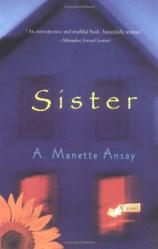Reading Group Guide
Discussion Questions
Sister

1. A. Manette Ansay begins her story with a quote from James McConkey: "Memory is, I believe, the human soul." Why has she chosen this particular phrase to characterize her novel? Would you say that this is a novel about memory?
2. In the culture Ansay describes, the male and female worlds are rigidly separated. "It was clear," Abby states, "that growing up meant one thing for Sam and, for me, something else" (p. 58). Why have such different gender models evolved? What functions have they served? How destructive are they to young people?
3. In what ways does the fire at the cannery continue to haunt the family 30 years after it happened? How has the memory of the fire contributed to forming the character and world views of the grandmother, the mother and even Abby herself, who was born years later?
4. Do you find Gordon Schiller to be a villain, or is he instead a pathetic, fearful man? Why is he so terrified that Sam might grow up to be a "sissy?" What aspects of his own character might Gordon be afraid to confront?
5. How does the religious atmosphere of her grandmother's house help to cure Abby from her breakdown? Why does Abby pray for a vocation? Why does she eventually reject her Catholic beliefs? Why do you think Abby's mother becomes increasingly religious after Sam's disappearance?
6. After Gordon leaves for Florida, Therese says, "Maybe your grandmother is right.... Maybe this is all my fault. Maybe I should have stayed home with you kids and kept house and agreed with everything your father said. Maybe that should have been enough" (p. 159). Would it have been, do you think? If his mother had stayed home, might Sam have been saved? Why does Therese's mother and family agree with Gordon that a woman should not work?
7. "I was angry with my father, but even more so with Sam, because he did not fight back" (p. 64), Abby says. How would you explain Sam's behavior with his father: is it passivity? Fear? Do you think that by asserting himself more Sam might have defied his father, or was he in a situation he could not have won? What kind of person might Sam had been without his father's taunts and bullying?
8. On page 96, Abby describes an intense, recurring dream. What is the meaning of this dream within the structure of Abby's life? Abby feels that she saved herself by abandoning her brother. Is there truth in this belief? By acting differently, might Abby have saved both herself and Sam?
9. Why does Abby's father make her smoke cigarettes on her 13th birthday? What sort of challenge is he posing her?
10. How much do you blame Abby's mother for going along with her husband's acts of cruelty toward their children? Is she what people would now call an "enabler?" To what extent, if any, does she protect the children from their father? Does she in fact protect herself at the expense of them? Do you think that any real love existed between the parents during the years Abby describes?
11. Why does Abby give up music and singing? Would you call this a self- destructive act, or an act of self-preservation? Why does her decision to stop studying music occur simultaneously with her realization that she no longer believes in the Church?
12. How do you explain Gordon's transformation from a bully to a man "nearly paralyzed with fear" (p. 175)? Does this transformation make sense to you, in the context of his character as it has been established? What is Gordon afraid of? Has he always been afraid?
13. Phoebe says to Abby, "People believe what they want" (p. 130). Later, Abby decides that people also "want to believe" (p. 189). At the end of the book, Abby's mother defines faith as "the ability to believe. The ability to see beyond the place where you are" (p. 226). Do you agree with the mother's assessment that faith is something Sam fatally lacked? What has faith done for Abby? Do you feel that Abby regains faith at the end of the novel? What, if anything, has her faith to do with religion?
14. A. Manette Ansay depicts the Wisconsin landscape with great care. In what way does the physical world of the novel affect the lives of the characters? How does it reflect what is going on in the characters' emotional world?
15. Do you think that Abby's decision to marry a man without religious beliefs was a deliberate one? Why might she have made this decision? In your opinion, was it the right one?
Sister
- Publication Date: June 1, 1997
- Paperback: 240 pages
- Publisher: Harper Perennial
- ISBN-10: 0380729768
- ISBN-13: 9780380729760







